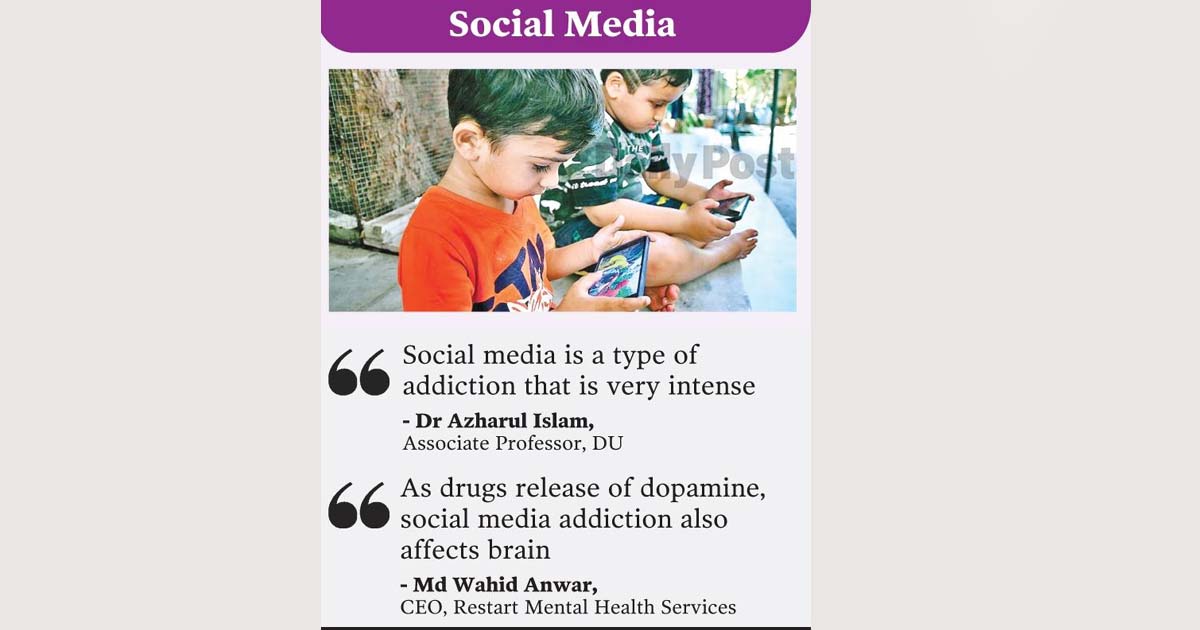Nowadays the whole world is surrounded by social media. Once upon a time, there was a culture of waking up in the morning and reading newspapers. Now this culture is on the verge of extinction. Newspapers have been replaced by social media where all the events happening in the world are described in a moment. But most people are always curious about what is happening, who is posting what.
Netizens are obsessed with mobile phone notifications. It is more dangerous than drugs, from children and teenagers to the elderly, most of the day is addicted to social media. As a result, mental health is affected and mental illness like depression, sleep disturbance as also on the rise. Once upon a time, people communicated directly with each other. Then came the advent of social media in the evolution of time. Time saved, cost reduced, communication also changed Facebook, Instagram, WhatsApp, Tiktok, YouTube, and various social media.
It was known that due to social media addiction, a type of hormone is released in the brain which is known as dopamine. Many people are sharing more and more interesting content in the competition to increase followers and likes. The more likes-comments-shares, the happier they are. And then their dopamine levels increase happily. In this way, addiction to social media continues to grow. Information technology has come to help people, but that technology is taking away the precious time of life. Many of them use their phones at night. There is sleep from 11 to 12 o'clock in the morning. But in the morning, go to school, college, varsity or work. But due to waking up at night, many important tasks of the day are missed. Due to which users are facing physical and mental problems.
According to a study published in the American Journal of Preventive Medicine, people who spend more than five hours a day on social media are 2.8 percent more likely to suffer from depression.
A University of Pennsylvania study found that excessive use of Facebook, Snapchat and Instagram increases feelings of loneliness rather than decreases. If social media is given more priority than personal relationships, anxiety disorders increase several times. In addition, about 10 percent of teenagers worldwide are accused of being cyber bullied on social media. There are many traps of false rumors and deception around these platforms. This can lead to chronic mental illness.
According to research, fear of missing out (FOMO) can force a person to pick up their phone every few minutes, check social media for updates, or check every message on the phone or even social media updates, taking risks while driving and prioritizing social media interactions at night. Research also said that endless selfies and sharing all the innermost thoughts of a person on social media can create an unhealthy self-centeredness and keep him away from real life connections. She may be completely driven by the use of social media and boost her ego.
Psychologists believed that shutting down social media is not the solution. Everything is already at hand before everyone has learned enough about social media. Many people cannot use it responsibly. So everyone should get enough education about social media and use it responsibly.
On social media, all kinds of people give opinions on different issues. For this reason, the mind and brain cannot stay stable for a long time in scrolling the screen, but in a very short time, different emotional reactions on the content of different statuses, such as feeling good, feeling bad, irritated, angry, etc. The internal stability of the mind and brain is greatly damaged. Every person is different in thought, consciousness, behavior and personality. There is no opportunity to compare one with the other. Those who want to build their own image or identity by comparing themselves to others, their happiness and sorrow largely depend on the hands of others. In this case, other mediums of social media very well provoke the mental tendency of comparing themselves to others all the time.
Researchers said that since this is a relatively new technology, there has been very little research on the long-term consequences, good or bad, of social media use. However, the studies that have already been done have been mentioned. Excessive use of social media has found a strong link between depression, anxiety, loneliness, self-harm, and even thoughts of suicide or suicide.
Sociologists believed that in a discriminatory society, social media is increasing the divide between the rich and the poor and has a huge impact on the mental state of the person. Egotism is being created among a section of people in the society centering on social media. They are sharing the attitude that I am the best, I am the best. Those who are rich in society, their way of life such as foreign travel, good food, good house, expensive car, children's good schooling, leisure or entertainment style, etc. are affecting the mental state of those who are backward in society. It creates a sense of frustration among them.
Dr Azharul Islam, associate professor and chairman of the Department of Educational and Counseling Psychology at Dhaka University, told The Daily Post that addiction is over-reliance despite reluctance. This dependence can be on people, objects, or any work. Social media is also a type of work in which the element of addiction is very intense. Social media addiction is a form of internet-based addiction. In adolescence, the person seeks his identity, wants to discover himself. They are using social media night after night, harming studies, getting involved in immoral relationships. Nowadays, relationships on social media are fastening. It is easy to communicate with one another. Because of this, extramarital affairs, multiple relationships are also increasing a lot. Many times they see something on Facebook that affects them. At some point, depression can even lead to serious and extreme decisions like ending oneself.
Asked about the overall situation, Psychological Counselor, CEO, Restart Mental Health Service, Md Wahid Anwar Rono told The Daily Post that just as drugs have a negative effect on the functioning of our brain's dopamine hormone and neurotransmitter, addiction to social media can affect the normal process of hormone secretion in our brain. And we identify non-substance addictions like social media addiction or shopping addiction as behavioral addiction. He also said that they waste a lot of a person's time, disturb the balance of emotional processes, create a negative effect on mood, reduce the ability to think and attention. People make a lot of wrong decisions by influencing decisions, spending money unnecessarily. As a result, you have to start taking psychotherapy to get out of social media addiction without delay. According to him, social media addiction is becoming more serious than drug addiction.
ARS












